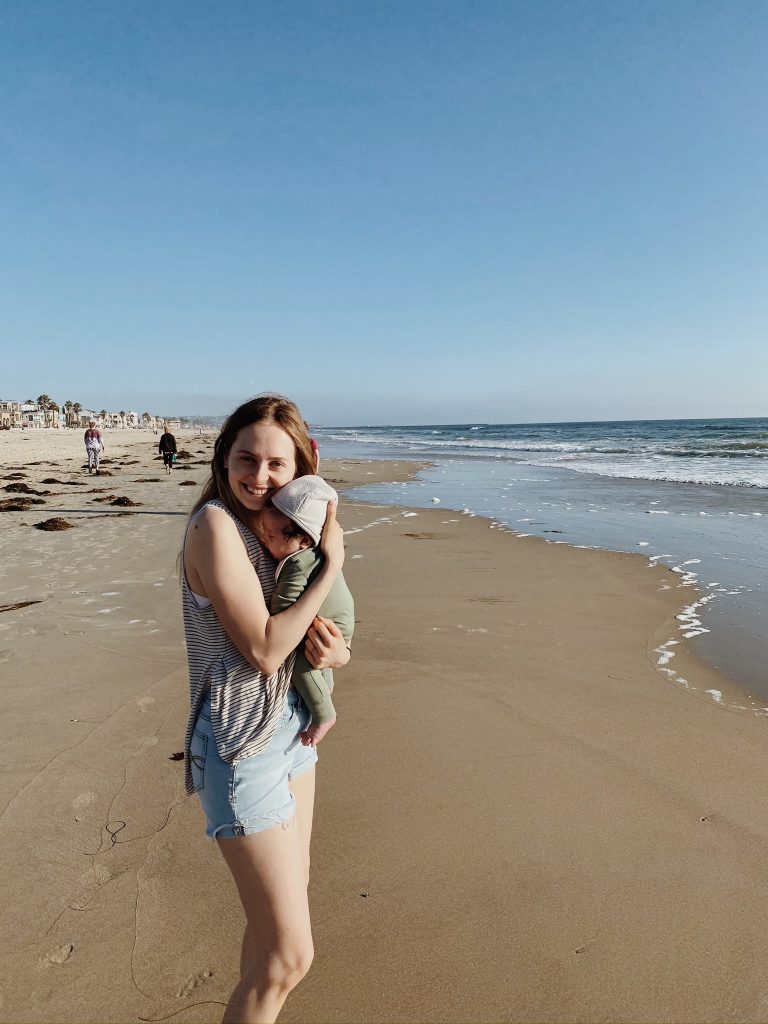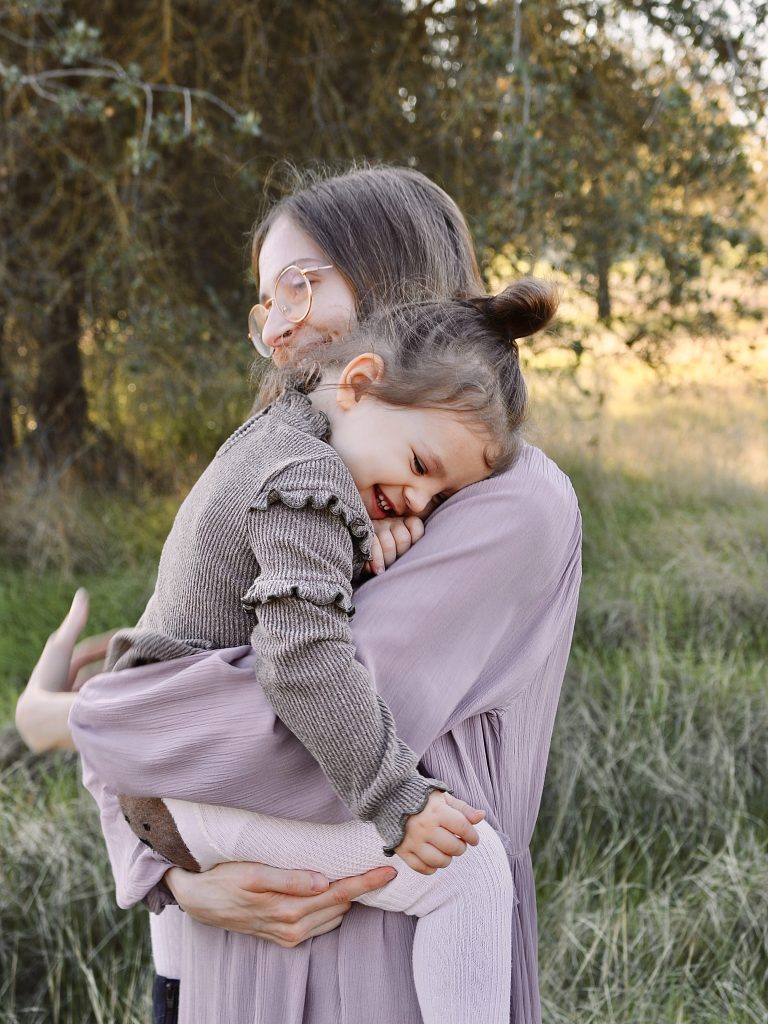As a mother pregnant with my first child, I found myself researching gentle birthing options, which led me to researching other related topics, such as ecologically breastfeeding, bed sharing, attachment parenting, and ultimately, gentle parenting. I simply could not wrap my mind around the idea of physically assaulting a child that I lovingly grew, gently birthed, and tenderly nourished and cared for as baby. No matter how I looked at it, spanking and punishing was too stark of a difference from the foundation I had laid down for my child from conception and the foundation that had been built within me from the moment I became a mother.
Once again, I found myself at a crossroads: to parent my children the way I was parented and continue another generational cycle of corporal punishment, or choose an another untraveled path and parent my children the way that aligned with me psychologically and spiritually—respectful, peaceful, gentle parenting (not to be confused with permissive parenting). I chose the latter.

What is discipline?
We often attribute spanking and punishment to discipline, but discipline doesn’t actually mean punishment. It means to disciple, or to teach.
Spanking is punishing. Teaching is disciplining.
Discipline is helping your children, who have underdeveloped brains, grow into kind, responsible, respectful, capable, healthy adults. Discipline is the work of the heart. It is not a quick way to get performative behavior from your children to make your life, and those you encounter, comfortable. It is arduous (although corporal punishment is too, in a different way) and requires you to grow and mature as you teach your children how to grow and mature. But the result of this method of disciplining preserves and deepens your relationship with your children and builds a strong foundation of mutual love and respect—something that is missed with corporal punishment.
I’ve found that corporal punishment appeals to many adults because it is the easier route, where you allow yourself to avoid doing the hard inner work that gentle parenting requires. It is the cowardly and lazy path, because you can coerce your children to do, or not do, anything at the threat of inflicted pain.
Gentle, respectful parenting requires patience and grace as your children develop. It requires strong willpower in holding healthy and safe boundaries. It requires humility in repenting and growing, as you also sin. It requires growing in the knowledge of child development and healthy parenting skills. It requires an immense amount of modeling the behavior you want your children to embody as they develop and grow into adults.
Understanding a child’s brain
When we are learning a new skill, as adults with developed brains, we sometimes have to see that skill demonstrated many times before attempting to try it. We continue to practice it over and over again until we improve, making mistakes as we practice. And once we perfect that skill, we can still occasionally mess up and make mistakes naturally.
Children are learning many new skills every single day. Their brains work at a fascinating pace to connect neurons and learn new skills. They are born with just basic physiological skills, and have millions of skills to learn to become healthy, capable adults. Every skill takes time to learn and even once perfected, mistakes will still happen.
We, as adults with developed brains, may have emotional outbursts. Hypocritically, we expect unfaltering emotional maturity from humans with underdeveloped brains, who are not capable psychologically of delivering the emotional maturity we expect from them. The part of the brain responsible for this maturity is not yet developed, and won’t be fully developed for quite some time.
There is no quick overnight method for discipline. Discipline means to teach. We model what we teach. We teach what we model. It will take at least two decades for your children’s brains to reach maturity. Expect to teach and model for at least two decades.
If it takes you a long time to learn a new skill with your developed brain, it will take your child much longer to learn many skills, especially with their underdeveloped brain.
What are you modeling? What you model is what you are teaching. If you yell, hit, punish, never apologize, lie, say nasty words, don’t keep your word, are impatient, lack compassion, and so forth, you cannot expect your child to act differently from you, even if you demand it. They will behave how you’ve modeled to them over and over again through your behavior.

What does corporal punishment miss?
You can physically, emotionally, or verbally punish (abuse) your children into fearing you and doing what you say, but that won’t grow you or grow them.
1. Grow you
When we realize that our children learn from what we model, we realize we have to change ourselves to become who we want our children to become. If I want my children to be kind, peaceful, tidy, responsible, respectful, patient, compassionate, etc, I need to be that and model that.
If I can’t be perfect in my actions, I can’t expect perfection from my children.
When I fail to be perfect, this is where I can model repentance, forgiveness, grace and my need for a Savior.
2. Grow them
Yes, children will obey out of fear of punishment, but that won’t teach them to do the right thing when no one is watching them. It also teaches to do the right thing only when there is someone there who can punish them.
Obeying because of the fear of punishment leads to a very shallow and superficial obedience that lacks the inner heart work. It doesn’t teach them how to cultivate a heart for kindness, compassion, patience, repentance, forgiveness, slowness to anger, self control, and other important qualities. It won’t help them in the future when they will lack emotional maturity, healthy communication skills and healthy boundaries. It won’t teach them what healthy relationships look like. It won’t teach them to problem solve or think critically. It won’t teach them the natural consequences of their actions and how their choices shape their lives and affect those around them. I’ve met many adults who are many decades of age, but have less emotional maturity than my five year old.
Discipline is not a quick process. It’s not an overnight process. It’s not a quick fix. It is teaching, modeling, communicating, and working together. It requires lots of patience, do-overs, apologizing, and forgiving. It will involve a lot of growing, and a lot of time.
Punishment is the quick method to get the results that you want to see. But it will lack the inner heart work for your child and for you. It lacks thousands of lessons that children are meant to learn. These thousands of lessons are foundational for children for holistic (physical, psychological, and spiritual) wellness as they grow into adults. It lacks connection. Corporal punishment always causes trauma, which is proven by scientific research—even more so when it’s done in a calm manner, as many Christians believe is the right way to spank. There is not one study that proves healthy outcomes from hitting children. And this makes sense. How can hitting, violence, punishment result in peacefulness, connection and growth? We don’t see this evident anywhere on this earth. In our immature, impatient, and selfish society, hitting is always wrong in every relationship, except when it involves vulnerable humans with underdeveloped brains.
As parents of our children, we have the responsibility to model to our children how to live a healthy life and how to respond to anything that we may encounter in life in a healthy way through our behavior. Our children learn how to interact with others by interacting with us. They learn how to respond in different circumstances by observing how we respond in different circumstances each day.
When we react violently, angrily, and punitively to our children, we are teaching our children to react violently, angrily, and punitively. They won’t know how to respond in a calm, peaceful, healthy way because they don’t experience it modeled to them by us firsthand. Who are they going to learn it from, if not you?
“But the fruit of the Spirit is love, joy, peace, forbearance, kindness, goodness, faithfulness, gentleness and self-control.” Let us model this to our children in how we disciple (teach) them daily, just like Jesus modeled, and still models this to us daily.

Gentle parenting resources
My favorite resources on this topic is Flourishing Homes and Families. They have a great book, great workshops, and a fantastic resources list for more books and resources, both faith based and science based, for healthy parenting. If you’re curious about Bible verses that have been used to condone spanking, be sure to take a look at their resources. They go through every verse that has wrongfully been used to justify corporal punishment with clear explanations and correct interpretations.
Flourishing Homes and Families resources:
- Free Lecture & Ebook on Spanking
- Free Resources
- Peacemaker Parenting Resources
- The Flourishing Family book
I hope this was encouraging to you, and perhaps even gives you the permission that you were looking for to pursue a way of disciplining that fosters connection, not trauma and fear. Cultivating healthy relationships with our children by modeling and teaching sets our children up for healthy relationships with everyone they encounter throughout life, with us, with their future partners and children, and most importantly, with God. When I think of my goal in parenting, I want my children to choose to have a close relationship with me as they become independent and are no longer are dependent on me. I’m not a perfect parent, but if my children bring some of my parenting methods into their future parenting journeys, that will be the ultimate way of knowing that by God’s grace, I did something right and this path was worth it.

